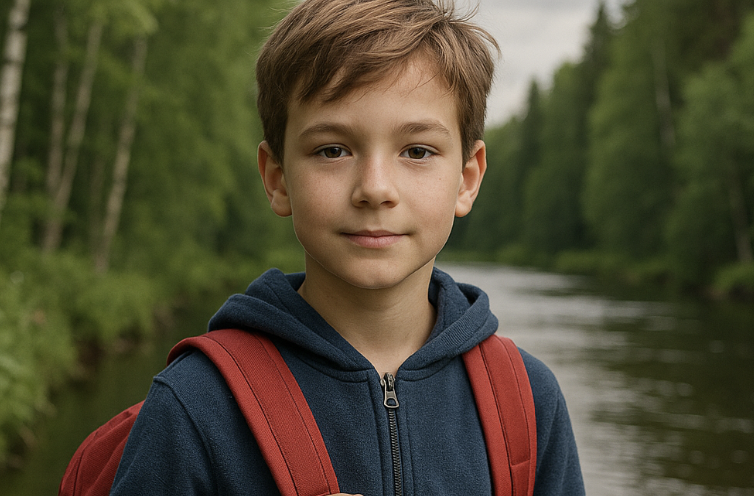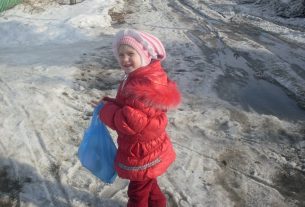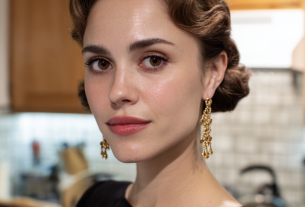Ten-year-old Grisha was hurrying home from school. His mother had warned him sternly not to linger. During the night their cow had calved, and Lyudmila Sergeyevna had spent the whole day with Zorya and the newborn.
He was supposed to heat up lunch, wash the dishes, and finish his homework. But the chores weren’t what pulled him home—it was the urge to see the baby calf. Newborns were so sweet and wobbly, and the way they drank warm milk from a bottle always made him laugh. How could he miss such a wonder?
He skipped along the riverbank, where the ice had finally gone and young grass curled at the edges of the water. As he neared the bend, he spotted an elderly woman, soaked through, shivering, and crying.
“Hello! What happened?” he asked, catching sight of a heap of drenched rags beside her. “Did you fall in?”
“Oh, child! I didn’t fall—I was pushed! And now I’m crying because I can’t believe how cruel people can be.” The old woman shook harder. “I thought I could reach the village to find a warm room, but a cramp seized me so badly I can’t breathe or move!”
“Grandma, hold on! I’ll be right back!” Grisha shouted, and tore off toward the village.
Lyudmila had just come in from the barn, washed her hands, and lain down to rest. Zorya had stubbornly refused to let down her milk—afraid, perhaps, that people would take it all and leave nothing for her May-born calf, whom they’d already named Mike.
Lyuda didn’t want to let the baby nurse directly: once he learned to drink from the cow, he’d never take a bucket; besides, if Zorya fed him herself, she’d refuse to be milked afterward.
Through the open window, Lyudmila could hear the soft calls between mother and calf. Her rest ended with the sharp bang of the front door.
“Grisha, is that you?” she called. “Why slam the door—are we on fire?”
“No, Mom—no fire. Worse! Someone’s dying by the river!”
“Who?” Lyudmila was on her feet at once.
“An old woman, sopping wet. Says someone shoved her in. She’s freezing and can’t walk! I’ll grab something warm!”
“Oh my goodness!” Lyudmila began rummaging through the cupboard. “Here—take your father’s old sheepskin and a scarf. Wait!” she cried suddenly. “We’ll take the cart we use for the milk cans. It might help!”
Grisha sprinted to the shed and rolled out the four-wheeled cart Lyudmila used to haul milk to the highway. She spread a sheepskin over it, laid her late husband’s coat on top, and they hurried toward the river.
The old woman was no longer sitting by her things; she lay curled on the grass, rigid with cold. Lyudmila tucked the garments around her, lifted her carefully, and eased her onto the cart. The woman felt weightless, like a child. She blinked back to herself, looked around with cloudy eyes, and tried to smile.
“Don’t worry, Grandma. You’re safe now,” Lyudmila said, and together she and her son wheeled the cart toward home.
Once Ksenia Petrovna had warmed in a hot bath, eaten, and held a steaming cup of tea, she had no words for her gratitude.
“Oh, my dears, may God grant you health, happiness, and long years for your kindness! Thank you, Lyudochka, for raising such a good boy!”
“Think nothing of it, Ksenia Petrovna. Anyone would have helped,” the hostess replied—though the old woman, who asked them to call her Baba Asya, shook her head.
“Don’t say that. Someone pushed me into that river!”
Lyudmila, burning with questions, sent Grisha to the barn to play with the calf and pulled her chair closer.
“I lived, Lyudochka, with my eldest son. He has a fine house. While his first wife, Lenochka, lived, we were all content. She worked in medicine, watched my pills, made sure I took them on time. When she fell ill, Vitalik hired a nurse and, later, took her to hospice.
“Six months after the funeral, my son brought home a new wife—Mila. A pretty, young model. She disliked me the moment she set eyes on me. Kept watch over me:
‘Mom, where are you going? You bring dust into the house!’
“I told her a body needs to move, and she sniffed, ‘Hoping to live to a hundred, are you?’
“I cried. I got nervous. I took sedatives; she yelled, ‘What is that old smell in here? Poisoning the house again with your pills?’
“One day she threw out all my medication. I held my tongue—didn’t want to cause quarrels.
“When my son left for an economic forum, my daughter-in-law went wild. She forbade me to leave my room. Luckily, I had my own bathroom. Finally, I asked:
‘Daughter, please take me to my younger son in the village.’
“She shouted first, then agreed. I packed my suitcase. She brought a paper bag.
‘Stuff everything in here. I’m not hauling your suitcase.’
“When we reached the bridge over the river, she stopped.
‘There—look! We’ve arrived.’
“I stepped out and stood on the bank.
‘Our village is across the river,’ I said.
“And she pushed me. I went into the water, bag and all. Then she turned the car around and drove away.
“How I got out, I don’t remember. Thank heaven the shore was shallow. The paper bag soaked through and tore apart. That’s how my daughter-in-law rid herself of me…”
The grandmother began to weep again, dabbing at her eyes with a crumpled handkerchief.
Lyudmila sat stunned. This needed the police. But when she suggested it, Baba Asya shook her head.
“God will judge her. I won’t testify.”
“And where will you go now?” Lyudmila asked gently.
“We’re close. What’s your village called?”
“Rubtsy.”
“The next one is Lozovaya. My younger son farms there—orchards and fields.”
“So you’re mother to our famous Rudkovsky? He’s a noted sponsor and benefactor!”
“Yes—Rudkovsky. My husband and I are from Lozovaya. Vitalik went to the city, and when his father died, he took me with him. Said there weren’t any women in Vitya’s house—who would look after me? Back then his wife was Lenochka.”
Just then Grisha burst back in, flushed and grassy.
“What on earth happened to you?” his mother laughed, plucking straw from his hair.
“I was with Mike. I climbed into the stall and lay down beside him—he licked my face! His tongue is like sandpaper!”
Lyudmila smiled. “Grishenka, remember we’re expecting guests on Saturday?”
“Of course! We practiced everything—I’m ready.”
“Wonderful.” She turned to their visitor. “Ksenia Petrovna, stay with us until Saturday, and then we’ll take you to your son.”
“Oh, I can’t impose another three days. I’ll try to get to Lozovaya myself.”
“No, no, no,” Lyuda said at once. “You’ll rest here, wash up, we’ll launder your things and give you proper bags.”
“I’m ashamed to add to your work…”
“Don’t worry—the washer’s already running, and the sun will dry everything quickly.”
Baba Asya stood and walked a little. “I do feel better. Perhaps I can help. I was a teacher in Lozovaya—I could hear Grisha’s lessons.”
Grisha led her to his room, spread out his books and notebooks. When she asked about the teachers, they discovered nearly half the staff in Rubtsy had once been her pupils. She remembered every name and told funny stories. Grisha gaped.
“Baba Asya, how can you remember so many people? There must be over a hundred!”
“I loved my work—and the children,” she sighed. “It’s just a pity Vitalik won’t give me any grandchildren.”
Three days later, she put on her best dress, stepped into her “concert” shoes, and pinned her hair. When Lyudmila came in, she blinked.
“Ksenia Petrovna—you look wonderful!”
“If only my hair hadn’t turned so gray,” the old woman chuckled. “So many good girls here, and Vitalik went to the city to chase happiness.”
Music floated from the schoolyard. Ksenia Petrovna followed Lyudmila quietly and sat on a bench.
The celebration marked the school’s tenth anniversary. After the director’s speech, a jeep rolled up and Viktor Rudkovsky stepped out. He offered congratulations and handed bouquets to the teachers. Then one of them announced:
“Today we’re honored to welcome the first teacher of many of our staff—the esteemed Ksenia Petrovna Rudkovskaya!”
Baba Asya looked at Lyuda in surprise. Lyuda was already applauding and beckoning her forward. Limping slightly, she reached the microphone. “What joy to see so many of my former students among the teachers!”
Viktor hurried up, presented a bouquet, and practically carried her off the stage. Around the corner of the building, they embraced tightly.
“Surprise! They told me to bring an extra bouquet, but I didn’t imagine it would be for you! How did you get here?”
“Oh, Vitenka—I’ll tell you at home. If it hadn’t been for Grisha and Lyuda…”
The next morning, just after Lyudmila finished milking Zorya, Viktor pulled up at the gate with a huge bouquet and knocked.
“Lyudmila, good day! Mother and I would like to invite you and Grisha to dinner at seven. What do you say?” He held out the flowers.
“Thank you, Viktor! I’d love to, but I’ve just given birth and can’t leave.”
“Then we’ll postpone. And tell me—why do you still milk by hand?”
“We’ve only the one cow. No sense in a machine.”
“I’ll bring one today,” the farmer promised.
By evening a milking machine stood in Lyudmila’s yard. Viktor helped set it up and asked to see the barn.
“Why such generosity?” she asked.
“You must look after your health. You’ve got a son growing—and who knows, maybe there’ll be more.”
That night he arrived with fruit, and for Grisha he brought a bicycle. The boy stared, wide-eyed. “This is for me? To keep?”
“Of course. For serious boy adventures,” Viktor grinned.
Grisha flung his arms around him. Rudkovsky had often helped families with groceries or school supplies, but this felt different. From the kitchen, Baba Asya appeared with a pie.
“Lyudochka, I baked like in the old days. Sit, have tea—I missed you.”
Viktor began stopping by often. Each time, Ksenia Petrovna tried to cook something special. Sometimes he came alone, asked after the farm, offered help. One evening he said quietly:
“Lyudochka, over these weeks I’ve grown very fond of you. You’ve become a warmth to me.”
“I feel the same,” Lyudmila admitted. “I thought you’d noticed.”
At the end of June they married. Viktor moved his things back to Lozovaya, rented out the Rubtsy house to summer visitors, and transferred Grisha to the new school. By July they were celebrating Viktor’s birthday—but Lyudmila couldn’t attend; she’d just delivered their second son, Stepan.
A week after they’d rescued Ksenia Petrovna, Viktor’s brother, Vitalik, arrived in Lozovaya. His young wife had been in a car wreck—her car had gone off into the river. She’d suffered a spinal injury and was bedridden.
When Ksenia asked if he’d been worried about her sudden disappearance, Vitalik answered without hesitation:
“Mila told me you went to Vitya’s, so I didn’t fret.”
Meanwhile, Grisha rode his new bicycle everywhere—to friends’ houses, the shop, the pharmacy for Baba Asya’s medicine. He pedaled with purpose and pride, feeling useful—and happy.



